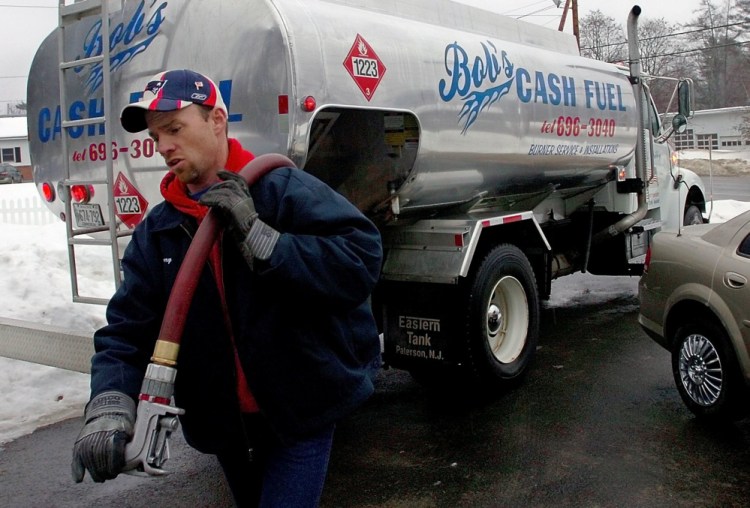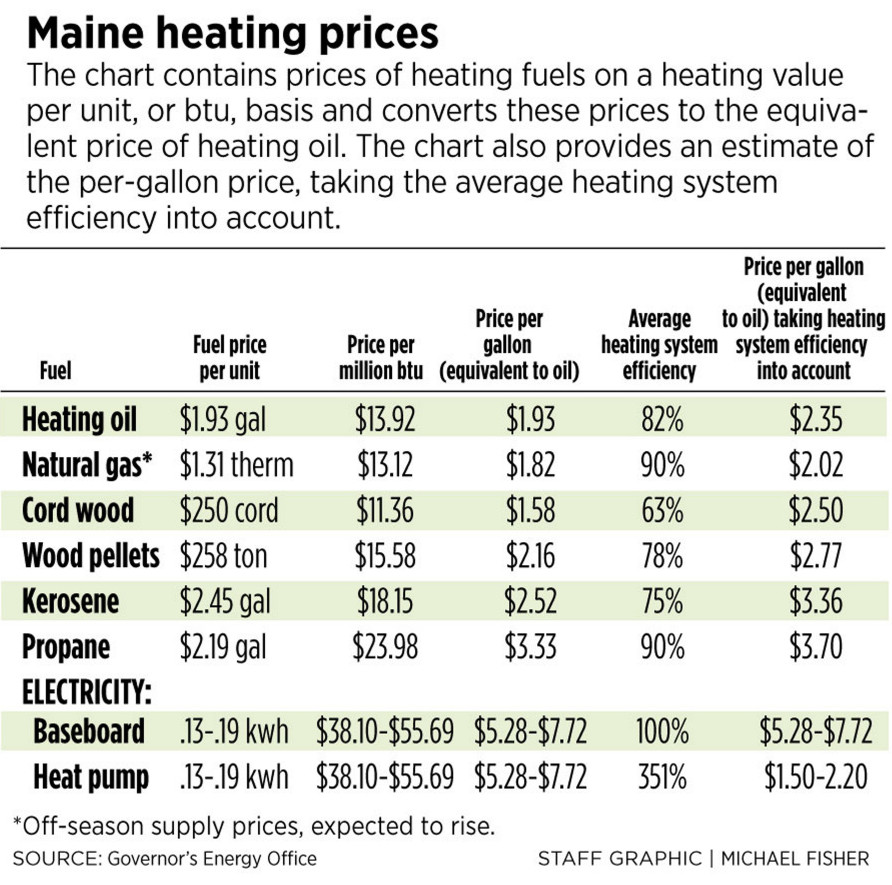The statewide average price for fuel oil inched above $2 a gallon this week for the first time since last November, ushering in a heating season in which oil prices are expected to rise moderately.
With winter temperatures predicted to be closer to normal, Mainers can expect a heating season that – on balance – is also likely to be closer to normal. It appears that there will be a sufficient supply of all fuels.
“It’s going to be a little more expensive than last year, based on higher prices and colder temperatures,” said Lisa Smith, senior planner at the Governor’s Energy Office. “But we were at decade-low prices last year.”
The latest price survey by Smith’s office, released Wednesday, shows fuel oil at an average of $2.01 a gallon statewide, ranging from a low of $1.76 in western Maine to $2.20 in central, eastern and northern regions. That’s up 4 cents over last week, and 13 cents a gallon since Oct. 1.
The survey follows projections last week from the U.S. Energy Information Administration that higher crude-oil costs will push up retail prices for heating oil by 42 cents a gallon over the winter.
The federal agency also is forecasting moderate price increases for propane and natural gas.
While propane prices fluctuate with the market, retail natural gas supply rates in Maine are reviewed by utility regulators and vary by service area. An average home served by Unitil, the state’s largest gas provider, will pay $1,178 this heating season, according to company estimates, compared with $1,080 last year.
Mainers who heat with wood should find plentiful supplies and prices that are either on par or lower than last year. Last winter’s bargain oil prices and mild temperatures kept firewood stacks and wood pellet bags from being depleted, creating a surplus in many homes.
Fuel oil remains the most-watched barometer for Maine heating costs, because two-thirds of homes burn it as their primary way to keep warm. And until this month, retail prices had more-or-less been falling since February 2014, when the statewide average hit $3.89. Last March, they bottomed out at below $1.70.
If temperatures this winter are in the normal range and oil prices average $2.20 statewide, that means a home that burns 800 gallons will pay $1,760.
“If it’s a normal winter, I don’t see any issues,” said George Gyorgy, co-owner of Charlie Burnham Heating Services in Freeport. “I think it will be fairly uneventful, which is good for everybody.”
Burnham’s cash price on Wednesday was $1.85 a gallon.
At Dead River Co., one of the state’s largest dealers, Wednesday’s cash price in Portland was $2.05 a gallon. But Deanna Sherman, the company’s president and chief executive, said many customers had taken advantage of pre-buy programs earlier this year to lock in at $2 a gallon for the season, or signed up for a price cap with a ceiling of $2.14 a gallon. These programs offer stability and predictable monthly payments, she said.
“Prices were down and people wanted to take advantage of it,” she said.
Above-average temperatures this fall have led cash-price customers to delay fill-ups, she said. But with a cool-down expected this weekend, Sherman expects phones to be ringing Monday morning.
A CHILLIER WEATHER FORECAST
The most recent forecast from the National Oceanic and Atmospheric Administration is calling for temperatures 17 percent colder in the Northeast this winter compared with last year, but slightly warmer than the average of the five preceding winters.
Michael Cempa, a meteorologist at the National Weather Service office in Gray, said the data he’s seeing for December, January and February is highly uncertain, as the El Nino weather pattern that has spiked global temperatures to record levels fades away.
“To me, it’s probably more of an average type of winter,” Cempa said, “although there is always the possibility for warm and cold spells.”
Portland typically experiences 7,001 heating degree days, a calculation that uses average temperatures to gauge heating demand. Last year, the city tallied only 6,119 heating degree days, which contributed to the second-warmest winter on record.
That warm weather meant people who heat with firewood, or use it to supplement their central heating systems, didn’t use as much.
“Most folks have leftover firewood,” said Kris Hutchins, operations manager at Southern Maine Firewood in Gorham. “Sales have been slower than last year.”
Hutchins said customers who typically order three cords of green wood in the spring asked for only one. At this time of year, people start calling for seasoned wood.
“We’ve run out of seasoned wood every year by December,” Hutchins said. “It doesn’t look like that will be the case this year.”
Slack demand also has lowered prices. Last year, seasoned wood ranged from $285 to $295 a cord. This year it’s going for $260.
Supplies of wood pellets and wood bricks are robust, said Bob Maurais of Southern Maine Renewable Fuels in Windham. Wood pellet inventories aren’t overflowing like cord wood, he said, because the lack of demand last winter forced several mills to shut down or curtail production.
A typical home customer buys three to four tons of pellets or two to three tons of bioproducts, such as compressed wood bricks and logs. The company expects to sell more than 3,000 tons of pellets and bricks this year.
USE OF HEAT PUMPS ON THE RISE
Still unclear is the rate for standard-offer electric service next year in Central Maine Power and Emera Maine service areas. The state Public Utilities Commission is expected to approve rates in late November, based on bids received from competitive energy suppliers.
Whatever the new rates, ductless electric heat pumps continue to be the most popular new heating source noted by Efficiency Maine, which offers $500 rebates for approved units. More than 15,000 homeowners have installed heat pumps over the past three years, with 1,650 units put in since July. Recently, the agency began offering an additional $250 rebate for second units.
The latest generation of ductless heat pumps are proving capable of warming homes, even at extremely low temperatures, said Dana Fischer, residential program manager at Efficiency Maine. Depending on the cost of electricity, the super-efficient units can provide heat at a price that’s equivalent to fuel oil at between $1.50 and $2.20 a gallon.
“We are seeing an increase in the number of homeowners choosing to install a second unit to provide heating and cooling to a second floor or the distant end of a ranch home,” Fischer said.
But even though energy prices are relatively low this winter, Fischer suggested all Mainers tighten up their homes with air sealing and insulation. That will make them more comfortable and save owners money every year, he said, regardless of what energy prices do in the future.
Copy the Story Link
Send questions/comments to the editors.





Success. Please wait for the page to reload. If the page does not reload within 5 seconds, please refresh the page.
Enter your email and password to access comments.
Hi, to comment on stories you must . This profile is in addition to your subscription and website login.
Already have a commenting profile? .
Invalid username/password.
Please check your email to confirm and complete your registration.
Only subscribers are eligible to post comments. Please subscribe or login first for digital access. Here’s why.
Use the form below to reset your password. When you've submitted your account email, we will send an email with a reset code.